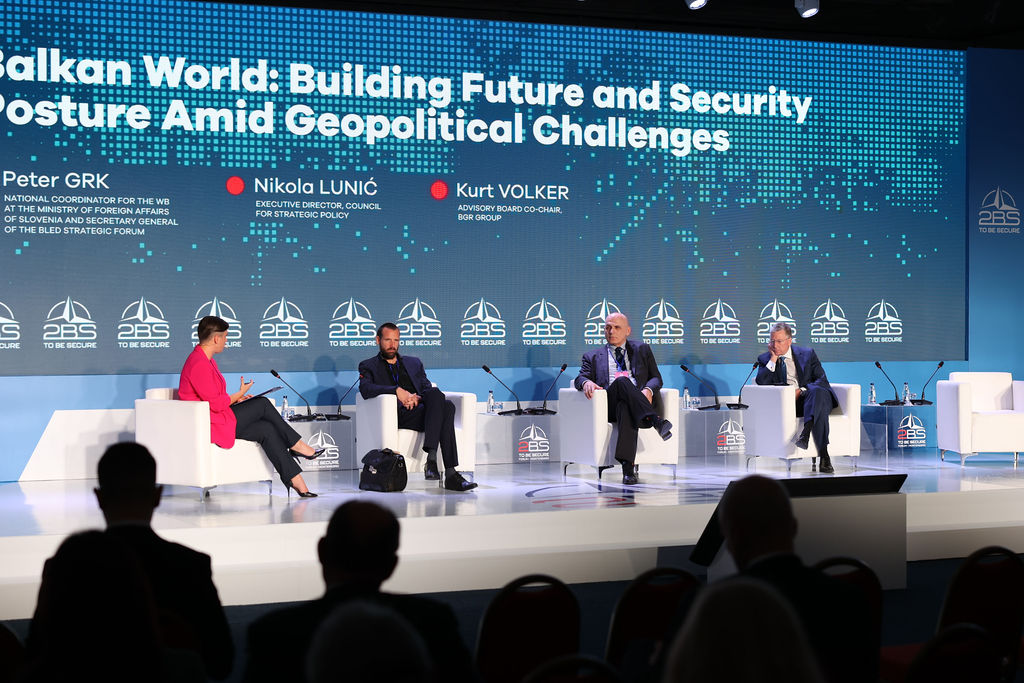There is currently an appetite for enlargement in Brussels, and it is up to the Balkan countries to seize this moment so that malicious actors do not fill the void in the Balkans and expand their influence. This was one of the messages from the panel titled Balkan World: Building Future and Security Posture Amid Geopolitical Challenges.
Peter Grk, the national coordinator for the Western Balkans in Slovenia’s Ministry of Foreign Affairs and the Secretary-General of the Bled Strategic Forum, stated that the countries of the Balkans cannot afford not to cooperate. However, he emphasized that the mentality of the region needs to change.
“How? I think it’s a long process; the enlargement process has been ongoing for 20 years, but we need to change our way of thinking in light of Russia’s aggression in Ukraine, as well as the EU’s mentality. In the Balkans, we still hear voices from the past that dwell on history without looking toward the future. Political elites must realize that while they are reopening old wounds, time is passing. Meanwhile, the geopolitical perspective of the region should serve as a lesson for both the region and its political elites to understand the moment we are in and to implement what they have repeated so many times in the past,” Grk said.
Grk also noted the importance of Slovenia being entrusted with the enlargement portfolio in the European Commission.
“It’s significant that Slovenia has established this portfolio and that our representative is leading it. However, in the end, it doesn’t matter who the commissioner is, even if it were the Pope. Everyone must do their homework. For 20 years, we’ve talked about how the process is unclear and how we don’t know where we’re going. But now, when we look at Montenegro, we have a clear situation and a clearly defined process. We know what Montenegro needs to do, and this enlargement process must happen,” Grk emphasized.
Grk believes there is a strong appetite for further enlargement in Brussels from the EU side, driven by practical reasons. According to him, this has been propelled by Russia’s aggression against Ukraine.
“There are dissenting voices in Europe, but even those countries that were once hesitant about enlargement are now turning toward that goal. The EU is ready, and we need a strong voice from the Balkans,” Grk emphasized.
Speaking about the Growth Plan and the plan for joining the single market, Grk believes the Balkan countries are not yet ready for entry into the single market.
“The rules of the single market are not respected in the Balkans, so the Growth Plan and everything related to it aim to establish an effective rule of law. There are no shortcuts. If they want to join the single market through the Growth Plan, they must do their part, and the most important aspect is the rule of law. There can be no single market if you don’t have institutions that uphold the rule of law and can show resilience to foreign influence,” Grk concluded.
Kurt Volker, former U.S. Ambassador to NATO, speaking about the situation in the Balkans, stated that we cannot assume everything is under control or that nothing bad will happen.
“There is a sense of complacency among the leaders, and they think they can play with identity issues. But that’s dangerous because it can spiral out of control. I don’t believe immediate violence will occur, but we cannot take for granted that it won’t,” Volker warned. According to him, the region is complacent for several reasons.
“There are leaders who benefit from playing the nationalist card, which is why they underestimate the intentions of various external actors who want to create disruption, especially Russia—and also the Russian church—which seeks to destabilize the region and keep it distant from Europe. There are people in the region who want to play this game, which is very dangerous,” the American diplomat emphasized.
Nikola Lunić, the executive director of the Council for Strategic Policies in Serbia, believes that military neutrality in the Balkans, particularly in Serbia, is largely symbolic.
“The Serbian budget is estimated at 76 billion euros. One and a half billion constitutes the military budget, and President Aleksandar Vučić has announced that an additional 730 million euros will be allocated to the military. Additionally, we have the purchase of Rafale aircraft for 420 million euros. When these transparent figures are added up, Serbia spends 3.5% of its GDP on the military, positioning it as the second-highest in military spending in Europe,” Lunić stated.
He pointed out that Serbia’s strategic documents do not indicate the need to enhance military capabilities, as there is, according to him, no imminent threat of conflict. Therefore, he argues that the Balkans are caught in a paradox where military conscription becomes the focus despite no clear military threat.
Lunić believes that the concept of military neutrality, based on the principle of total defense, is more virtual than real, as it does not align with Serbia’s foreign policy.
“Vučić says we are militarily neutral, but we are not politically neutral externally, which means that such military neutrality is meaningless,” Lunić emphasized.
